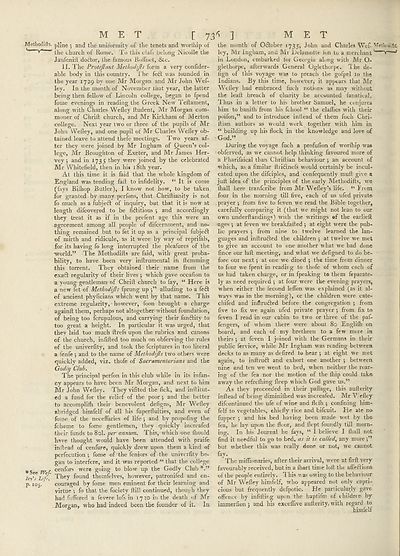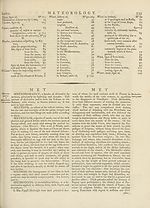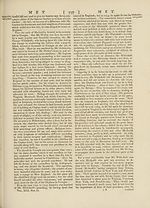Encyclopaedia Britannica, or, a Dictionary of arts, sciences, and miscellaneous literature : enlarged and improved. Illustrated with nearly six hundred engravings > Volume 13, MAT-MIC
(782) Page 736
Download files
Complete book:
Individual page:
Thumbnail gallery: Grid view | List view

Methoclifts.
* See Wef-
lex's Life.
p. 105.
MET [ 73
pline ; and tlie uniformity of the tenets and worlhip of
the church of Rome. To this claR belong Nieolle the
Janfenilf dobtor, the famous Boffuet, &c.
II. The Prate/}ant Method/}s form a very confider-
able body in this country. i he fe£t was founded in
the year 1729 by one Mr Morgan and Mr John Wef-
ley. In the month of November that year, the latter
being then fellow of Lincoln college, began to fpend
fome evenings in reading the Greek New Teftament,
along with Charles Welley iludent, Mr Morgan com¬
moner of Chritl church, and Mr Kirkham of Merton
college. Next year two or three of the pupils of Mr
John WeOey, and one pupil of Mr Charles Wefley ob¬
tained leave to attend thefe meetings. Two years af¬
ter they u'ere joined by Mr Ingham of Queen’s col¬
lege, Mr Broughton of Exeter, and Mr James Her-
vey j and in 1735 they were joined by the celebrated
Mr Whitefield, then in hi* 18th year.
At this time it is faid that the whole kingdom of
England was tending fait to infidelity. “ It is come
(fays Bilhop Butler), I know not how, to be taken
for granted by many perfons, that Chriftianity is not
fo much as a fubjecR of inquiry, but that it is now at
length difcovered to be fidtitious ; and accordingly
they treat it as if in the prefent age this were an
agreement among all people of difcernment, and no¬
thing remained but to fet it up as a principal fubjeft
of mirth and ridicule, as it were by way of reprifals,
for its having fo long interrupted the pleafures of the
"world.” The Methodifts are faid, with great proba¬
bility, to have been very inllrumental in Hemming
this torrent. They obtained their name from the
exatSl regularity of their lives ; which gave occafion to
a young gentleman of Chrift church to fay, “ Here is
a new fet of McthodJIs fprung up j” alluding to a fe£t
of ancient phylicians which went by that name. This
extreme regularity, however, foon brought a charge
againft them, perhaps not altogether'without foundation,
of being too fcrupulous, and carrying their fenflity to
too great a height. In particular it was urged, that
they laid too much ftrefs upon the rubrics and canons
of the church, infilled too much on obferving the rules
of the univerfity, and took the fcriptures in too literal
a i’enfe 5 and to the name of Methodifts two others were
quickly added, viz. thofe of Sctcramenturians and the
Godiy Club.
The principal perfon in this club while in its infan¬
cy appears to have been Mr Morgan, and next to him
Mr John Welley. They vifited the lick, and inlfitut-
ed a fund for the relief of the poor*, and the better
to accomplifh their benevolent defigns, Mr Welley
abridged bimfelf of all his fuperfluities, and even of
fome of the neceffaries of life ; and by propofing the
fcheme to fome gentlemen, they quickly increafed
their funds to Sol. per annum. This, which one Ihould
have thought would have been attended with praife
rnltead of cenfure, quickly drew upon them a kind of
perfecution *, fome of the feniors of the univerfity be¬
gan to interfere, and it was reported “ that the college
cenfors were going to blow up the Godly Club
They found themfelves, however, patronifed and en¬
couraged by fome men eminent for their learning and
virtue ; fo that the fociety Hill continued, though they
had fuffered a fevrre lofs in 17 to in the death of Mr
Morgan, who had indeed been the founder of it. In
5 ] MET
the month of October 1735, John and Charles Wef-
ley, Mr Ingham, and Mr Eelamotte ion to a merchant
in London, embarked for Georgia along with Mr O-
glethorpe, aftenvards General Oglethorpe. 1 he de-
lign of this voyage was to preach the gofpel to the
Indians. By this time, however, it appears that Mr
Wefley had embraced fuch notions as may without
the lealt breach of charity be accounted fanatical.
Thus in a letter to his brother Samuel, he conjures
him to banilh from his fchool “ the dallies with their
poifon,” and to introduce inilead of them fuch Chri-
itian authors as would work together with him in
“ building up his flock in the knowledge and love of
God.”
During the voyage fuch a profufion of worlhip was
' obferved, as we cannot help thinking favoured more of
a Pharifaical than Chriftian behaviour ; an account of
which, as a fimilar ftiiclnds would certainly be incul¬
cated upon the difciples, and confequently muft give a
jufl idea of the principles of the early Methodifts, we
fliall here tranferibe from Mr Wefley’s life. “ From
four in the morning till five, each of us ufed private
prayer ; from five to feven we read the Bible together,
carefully comparing it (that we might not lean to our
own underftandings) with the writings of the earlieft
ages j at feven we breakfafted ; at eight were the pub¬
lic prayers 5 from nine to twelve learned the lan¬
guages and inftrudled the children ; at twelve we met
to give an account to one another what we had done
fince our laft meeting, and what we defigned to do be¬
fore our next *, at one we dined ; the time from dinner
to four we fpent in reading to thofe of whom each of
us had taken charge, or in fpeaking to them feparate-
ly as need required *, at four were the evening prayers,
when either the lecond leffon was explained (as it al¬
ways wras in the morning), or the children were cate-
chifed and inftrufted before the congregation ; from
five to fix we again ufed private prayer ; from fix to
feven I read in our cabin to two or three of the paf-
fengers, of whom there wrere about 80 Englilh on
board, and each of my brethren to a few more in
theirs ; at feven I joined with the Germans in their
public fervice, while Mr Ingham was reading between
decks to as many as defired to hear 5 at eight we met
again, to inftrudf and exhort one another j between
nine and ten wre went to bed, when neither the roar¬
ing of the fea nor the motion of the flfip could take
away the refrelhing fleep which God gave us.”
As they proceeded in their pafiage, this aufterity
inflead of being diminifhed was increafed. Mr V/efley
difeontinued the ufe of wfine and fit Hr ; confining him-
felf to vegetables, chiefly rice and bifeuit. He ate no
fupper *, and his bed having been made w'et by the
fea, he lay upon the floor, and flept foundly till morn¬
ing. In his Journal he fays, “ I believe I fliall not
find it needfui to go to bed, as it is called, any more 5”
but whether this was really done or not, we cannot
fay.
The miflionaries, after their arrival, were at firft very
favourably received, but in a (hurt time loft the afieftions
of the people entirely. This w a> owing to the behaviour
of Mr Wefley himfelf, who appeared not only capri¬
cious but frequently defpotic. He particularly gave
offence by infilling upon the baptifm of ehiidnn by
immerfion ; and his exceflive aufterity, with regard to
himfelf
* See Wef-
lex's Life.
p. 105.
MET [ 73
pline ; and tlie uniformity of the tenets and worlhip of
the church of Rome. To this claR belong Nieolle the
Janfenilf dobtor, the famous Boffuet, &c.
II. The Prate/}ant Method/}s form a very confider-
able body in this country. i he fe£t was founded in
the year 1729 by one Mr Morgan and Mr John Wef-
ley. In the month of November that year, the latter
being then fellow of Lincoln college, began to fpend
fome evenings in reading the Greek New Teftament,
along with Charles Welley iludent, Mr Morgan com¬
moner of Chritl church, and Mr Kirkham of Merton
college. Next year two or three of the pupils of Mr
John WeOey, and one pupil of Mr Charles Wefley ob¬
tained leave to attend thefe meetings. Two years af¬
ter they u'ere joined by Mr Ingham of Queen’s col¬
lege, Mr Broughton of Exeter, and Mr James Her-
vey j and in 1735 they were joined by the celebrated
Mr Whitefield, then in hi* 18th year.
At this time it is faid that the whole kingdom of
England was tending fait to infidelity. “ It is come
(fays Bilhop Butler), I know not how, to be taken
for granted by many perfons, that Chriftianity is not
fo much as a fubjecR of inquiry, but that it is now at
length difcovered to be fidtitious ; and accordingly
they treat it as if in the prefent age this were an
agreement among all people of difcernment, and no¬
thing remained but to fet it up as a principal fubjeft
of mirth and ridicule, as it were by way of reprifals,
for its having fo long interrupted the pleafures of the
"world.” The Methodifts are faid, with great proba¬
bility, to have been very inllrumental in Hemming
this torrent. They obtained their name from the
exatSl regularity of their lives ; which gave occafion to
a young gentleman of Chrift church to fay, “ Here is
a new fet of McthodJIs fprung up j” alluding to a fe£t
of ancient phylicians which went by that name. This
extreme regularity, however, foon brought a charge
againft them, perhaps not altogether'without foundation,
of being too fcrupulous, and carrying their fenflity to
too great a height. In particular it was urged, that
they laid too much ftrefs upon the rubrics and canons
of the church, infilled too much on obferving the rules
of the univerfity, and took the fcriptures in too literal
a i’enfe 5 and to the name of Methodifts two others were
quickly added, viz. thofe of Sctcramenturians and the
Godiy Club.
The principal perfon in this club while in its infan¬
cy appears to have been Mr Morgan, and next to him
Mr John Welley. They vifited the lick, and inlfitut-
ed a fund for the relief of the poor*, and the better
to accomplifh their benevolent defigns, Mr Welley
abridged bimfelf of all his fuperfluities, and even of
fome of the neceffaries of life ; and by propofing the
fcheme to fome gentlemen, they quickly increafed
their funds to Sol. per annum. This, which one Ihould
have thought would have been attended with praife
rnltead of cenfure, quickly drew upon them a kind of
perfecution *, fome of the feniors of the univerfity be¬
gan to interfere, and it was reported “ that the college
cenfors were going to blow up the Godly Club
They found themfelves, however, patronifed and en¬
couraged by fome men eminent for their learning and
virtue ; fo that the fociety Hill continued, though they
had fuffered a fevrre lofs in 17 to in the death of Mr
Morgan, who had indeed been the founder of it. In
5 ] MET
the month of October 1735, John and Charles Wef-
ley, Mr Ingham, and Mr Eelamotte ion to a merchant
in London, embarked for Georgia along with Mr O-
glethorpe, aftenvards General Oglethorpe. 1 he de-
lign of this voyage was to preach the gofpel to the
Indians. By this time, however, it appears that Mr
Wefley had embraced fuch notions as may without
the lealt breach of charity be accounted fanatical.
Thus in a letter to his brother Samuel, he conjures
him to banilh from his fchool “ the dallies with their
poifon,” and to introduce inilead of them fuch Chri-
itian authors as would work together with him in
“ building up his flock in the knowledge and love of
God.”
During the voyage fuch a profufion of worlhip was
' obferved, as we cannot help thinking favoured more of
a Pharifaical than Chriftian behaviour ; an account of
which, as a fimilar ftiiclnds would certainly be incul¬
cated upon the difciples, and confequently muft give a
jufl idea of the principles of the early Methodifts, we
fliall here tranferibe from Mr Wefley’s life. “ From
four in the morning till five, each of us ufed private
prayer ; from five to feven we read the Bible together,
carefully comparing it (that we might not lean to our
own underftandings) with the writings of the earlieft
ages j at feven we breakfafted ; at eight were the pub¬
lic prayers 5 from nine to twelve learned the lan¬
guages and inftrudled the children ; at twelve we met
to give an account to one another what we had done
fince our laft meeting, and what we defigned to do be¬
fore our next *, at one we dined ; the time from dinner
to four we fpent in reading to thofe of whom each of
us had taken charge, or in fpeaking to them feparate-
ly as need required *, at four were the evening prayers,
when either the lecond leffon was explained (as it al¬
ways wras in the morning), or the children were cate-
chifed and inftrufted before the congregation ; from
five to fix we again ufed private prayer ; from fix to
feven I read in our cabin to two or three of the paf-
fengers, of whom there wrere about 80 Englilh on
board, and each of my brethren to a few more in
theirs ; at feven I joined with the Germans in their
public fervice, while Mr Ingham was reading between
decks to as many as defired to hear 5 at eight we met
again, to inftrudf and exhort one another j between
nine and ten wre went to bed, when neither the roar¬
ing of the fea nor the motion of the flfip could take
away the refrelhing fleep which God gave us.”
As they proceeded in their pafiage, this aufterity
inflead of being diminifhed was increafed. Mr V/efley
difeontinued the ufe of wfine and fit Hr ; confining him-
felf to vegetables, chiefly rice and bifeuit. He ate no
fupper *, and his bed having been made w'et by the
fea, he lay upon the floor, and flept foundly till morn¬
ing. In his Journal he fays, “ I believe I fliall not
find it needfui to go to bed, as it is called, any more 5”
but whether this was really done or not, we cannot
fay.
The miflionaries, after their arrival, were at firft very
favourably received, but in a (hurt time loft the afieftions
of the people entirely. This w a> owing to the behaviour
of Mr Wefley himfelf, who appeared not only capri¬
cious but frequently defpotic. He particularly gave
offence by infilling upon the baptifm of ehiidnn by
immerfion ; and his exceflive aufterity, with regard to
himfelf
Set display mode to:
![]() Universal Viewer |
Universal Viewer | ![]() Mirador |
Large image | Transcription
Mirador |
Large image | Transcription
Images and transcriptions on this page, including medium image downloads, may be used under the Creative Commons Attribution 4.0 International Licence unless otherwise stated. ![]()
| Permanent URL | https://digital.nls.uk/192694216 |
|---|
| Attribution and copyright: |
|
|---|
| Description | Ten editions of 'Encyclopaedia Britannica', issued from 1768-1903, in 231 volumes. Originally issued in 100 weekly parts (3 volumes) between 1768 and 1771 by publishers: Colin Macfarquhar and Andrew Bell (Edinburgh); editor: William Smellie: engraver: Andrew Bell. Expanded editions in the 19th century featured more volumes and contributions from leading experts in their fields. Managed and published in Edinburgh up to the 9th edition (25 volumes, from 1875-1889); the 10th edition (1902-1903) re-issued the 9th edition, with 11 supplementary volumes. |
|---|---|
| Additional NLS resources: |
|

